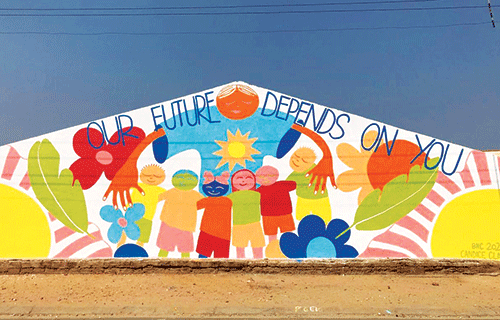Jaenique Swartz
THE African Millimetre Telescope (AMT) project, a collaborative effort between the University of Namibia (Unam), Radboud University, the University of Amsterdam, Oxford University, and the University of Turku, has received the prestigious 2024 Annie Maunder Medal for Outreach from the Royal Astronomical Society (RAS).
The AMT project aims to establish the first millimetre-wave radio telescope in the Namibian highlands, contributing to the capabilities of the Event Horizon Telescope network and creating a more inclusive environment between scientists, the public, and the government.
The project gained recognition after capturing groundbreaking images of a black hole in 2019 and it understands the role it plays in educating the masses and has subsequently taken up the role of spreading public awareness on the ins and outs of astronomy.
Marc Klein Wolt, AMT project manager from Radboud University, emphasized the project’s goal of making astronomy accessible to all Namibians, fostering participation, and creating a sense of ownership.
“The goal was clear, to make the wonders of astronomy accessible to all Namibians encouraging their participation and fostering a sense of ownership in the groundbreaking AMT project,” said Wolt.
The project was lauded by the RAS for its innovative approach to providing interactive and immersive astronomy experiences to the Namibian public.
Through a powerful projector and advanced planetarium software, Wolt said the AMT mobile planetarium projects the night sky onto the inside of an inflatable dome using state-of-the-art technology.
He said this interactive and educational experience has proved to be extremely effective, capturing the attention of audiences ranging from kindergarten children to university students, and from rural school pupils to the Head of State.
The Annie Mauder Medal for Outreach was launched in 2016 as part of the society’s celebration of the centenary of the admission of women to fellowship.
The AMT mobile planetarium has conducted more than 400 shows at about 70 locations.
The shows have been attended by more than 10 600 Namibians, showcasing the widespread impact of the educational initiative.
The support from the Unam team, the Radboud University technical staff, and the Dutch Research School of Astronomy (NOVA) as well as a donation of N$450 000 from Nedbank Namibia to the project last year has enabled the expansion of the team with new student presenters in 2024 and for the project to reach and educate more citizens.
-jaeniqueswartz@icloud.com



